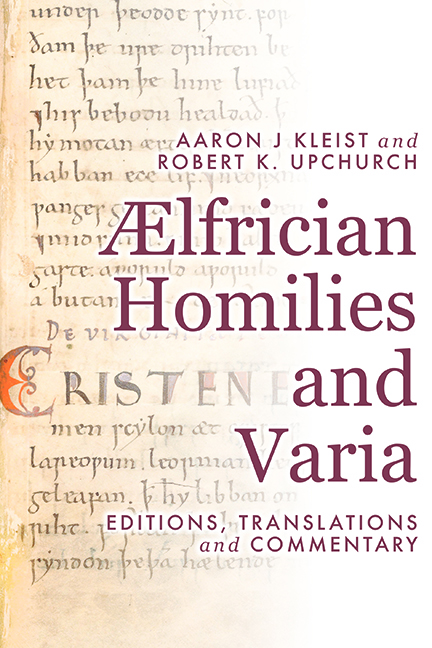Book contents
- Frontmatter
- Contents
- Preface
- Acknowledgements
- Abbreviations
- Sigla for Cited Ælfrician Manuscripts
- Dates for Cited Ælfrician Works
- Editorial Conventions
- Conventions Used in the Commentaries
- Homilies The Proper of the Season
- Homilies The Proper of the Saints
- Ælfrician Homilies and Varia: Editions, Translations, and Commentary: Volume II
- Homilies The Common of the Saints
- Homilies Unspecified Occasions
- Varia
- Works Cited
- Index
- ANGLO-SAXON TEXTS
17 - Be þam Halgan Gaste (‘Concerning the Holy Spirit’)
Published online by Cambridge University Press: 05 March 2024
- Frontmatter
- Contents
- Preface
- Acknowledgements
- Abbreviations
- Sigla for Cited Ælfrician Manuscripts
- Dates for Cited Ælfrician Works
- Editorial Conventions
- Conventions Used in the Commentaries
- Homilies The Proper of the Season
- Homilies The Proper of the Saints
- Ælfrician Homilies and Varia: Editions, Translations, and Commentary: Volume II
- Homilies The Common of the Saints
- Homilies Unspecified Occasions
- Varia
- Works Cited
- Index
- ANGLO-SAXON TEXTS
Summary
Be þam Halgan Gaste (‘Concerning the Holy Spirit’), as the work is titled in one manuscript, is Ælfric's expanded, vernacular version of De septiformi spiritu (AH II.16), his Latin tract on the seven attributes of the Holy Spirit and of the evil spirit, the devil. In the Latin tract, he devotes one sentence to each good attribute and its wicked and worse counterparts. In Be þam Halgan Gaste, he treats the virtues [lines 1–37] and vices [lines 38–72] separately and at greater length, providing Old English equivalents for each set of Latin terms and then explaining each gifu (‘gift’) and ungifu (‘evil gift’) in detail. One who possesses wisdom, for example, turns his mind to the Lord's will and good works [lines 17–19]; one given to foolishness ignores wisdom, lives unwisely, and pretends to be wise [lines 54–8]. The tract's conclusion encapsulates its didactic thrust: the behaviors described therein enable one to discern if God's Spirit or the devil indwells a person [lines 78–9]. A comment near its outset makes the work applicable to all Christians, since the Holy Spirit gives to godly people the gifts that indwelled Christ perfectly [lines 11–16].
Although we edit De septiformi spiritu (AH II.16) and Be þam Halgan Gaste (AH II.17) separately, Ælfric, as noted in the previous chapter, probably wrote both tracts as a single work (with the Latin positioned first) for Wulfstan between about 998 and 1002, and then kept copies for himself in a Commonplace Book that no longer survives. Several years later he reused Be þam Halgan Gaste in its entirety as the first part of Be ðam Seofanfealdan Ungifa (AH I.6), assuming he was responsible for that composite homily. Ælfric, in fact, shows an interest in the Spirit's sevenfold gifts throughout his career. Enumerations and extended treatments occur in the Catholic Homilies [CH I.22, and CH II.16 and 25] (989–92), in De septiformi spiritu and Be þam Halgan Gaste (998–1002), and in Be ðam Seofanfealdan Ungifa and his sermon for the Sunday after the Ascension [SH I.9] (1002–5). His treatment of the subject in Be þam Halgan Gaste can usefully be understood as an effort to equip Christians for spiritual warfare against the devil.
- Type
- Chapter
- Information
- Ælfrician Homilies and VariaEditions, Translations, and Commentary, pp. 803 - 826Publisher: Boydell & BrewerPrint publication year: 2022

